Efficiency is pivotal when it comes to the quick-moving world of accounting. Accountants strive to optimize processes, reduce manual tasks, and improve accuracy to meet the evolving demands of their clients. The rise of technology has brought forth a game-changer in the form of Robotic Process Automation (RPA).
By automating repetitive tasks and streamlining workflows, RPA is transforming the accounting industry, offering improved work efficiency, enhanced client outcomes, and a competitive edge for those who embrace its potential.
Did You Know?
- Over 60% of accounting firms have already implemented or are planning to implement RPA in their operations. (Source: Deloitte, 2023 Global RPA Survey)
- RPA can automate up to 80% of accounting tasks, freeing up accountants to focus on more strategic and value-added activities. (Source: PwC, 2023 Accounting Technology Trends Report)
- Companies that implement RPA in accounting can achieve a 20-30% reduction in operational costs. (Source: Gartner, 2023 RPA Market Guide)
- RPA can help accounting firms improve their audit quality and reduce compliance risks. (Source: Association of Certified Fraud Examiners, 2023 ACFE Fraud Study)
- Clients of accounting firms that use RPA are more satisfied with the services they receive. (Source: Clutch, 2023 Accounting Outsourcing Client Satisfaction Survey)
- RPA is expected to create over 2.3 million jobs in the accounting and financial services industry by 2030. (Source: World Economic Forum, 2022 Future of Jobs Report)
Understanding the role RPA in Accounting
So, what exactly is Robotic Process Automation? In simple terms, RPA involves the use of software robots, also known as “bots,” to automate mundane and rule-based tasks that were once performed by humans. These bots are programmed to follow predefined rules and guidelines, mimicking human interactions with various software applications and systems.
By harnessing the power of RPA, accountants can revolutionize their work processes, free up valuable time, and focus on higher-value activities that require critical thinking and expertise.
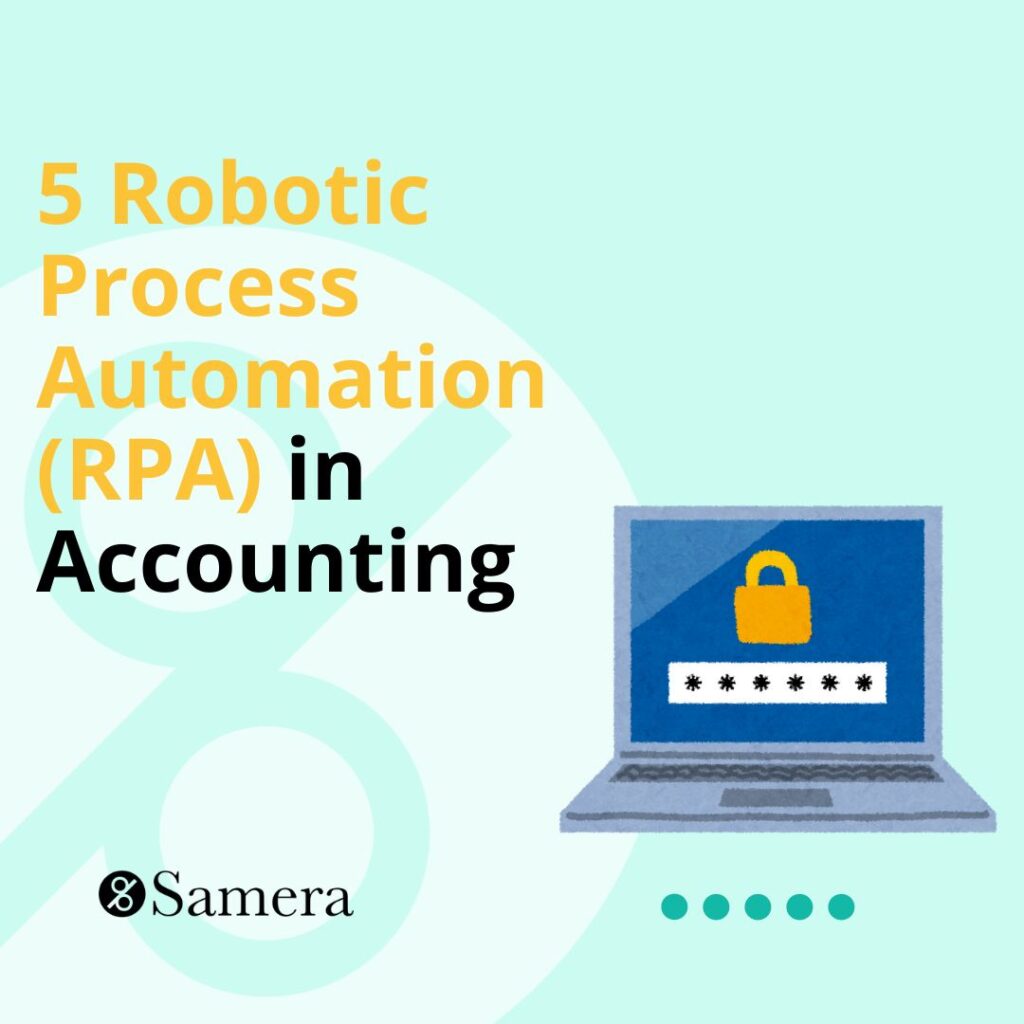
Here are 5 key benefits that RPA brings to accounting:
Enhanced Work Efficiency
RPA automates repetitive and rule-based tasks that were once performed manually, such as data entry, report generation, and invoice processing. By eliminating these time-consuming tasks, accountants can focus on more strategic activities that require critical thinking and analysis. This leads to enhanced work efficiency, as RPA executes tasks swiftly and accurately, freeing up valuable time for accountants to add greater value to their clients.
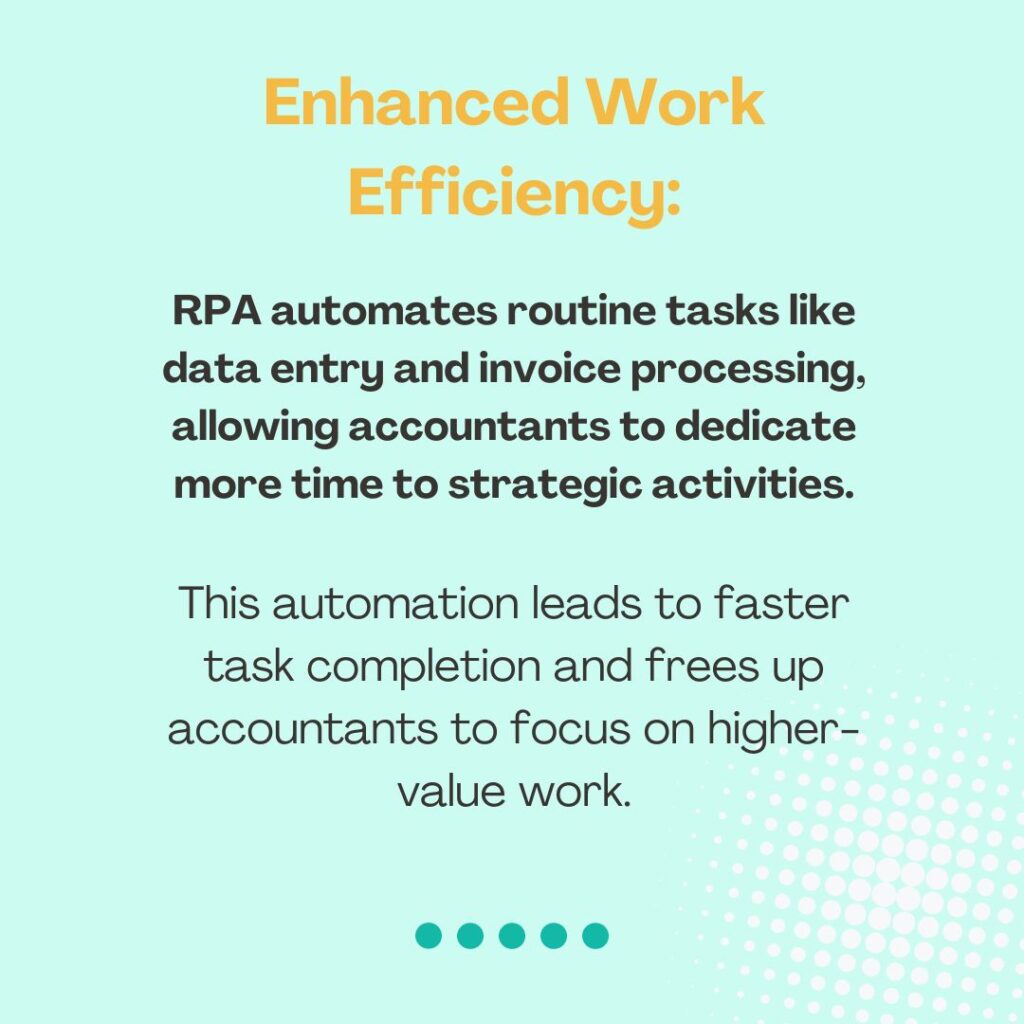
Improved Accuracy and Compliance
Manual data entry and calculations are prone to human errors, which can lead to financial discrepancies and compliance issues. RPA eliminates the risk of errors by ensuring consistent and precise results. Bots follow predefined rules and guidelines, reducing the likelihood of mistakes and improving data accuracy. With RPA, accountants can maintain high levels of compliance with regulatory requirements, providing clients with reliable financial information and reports.
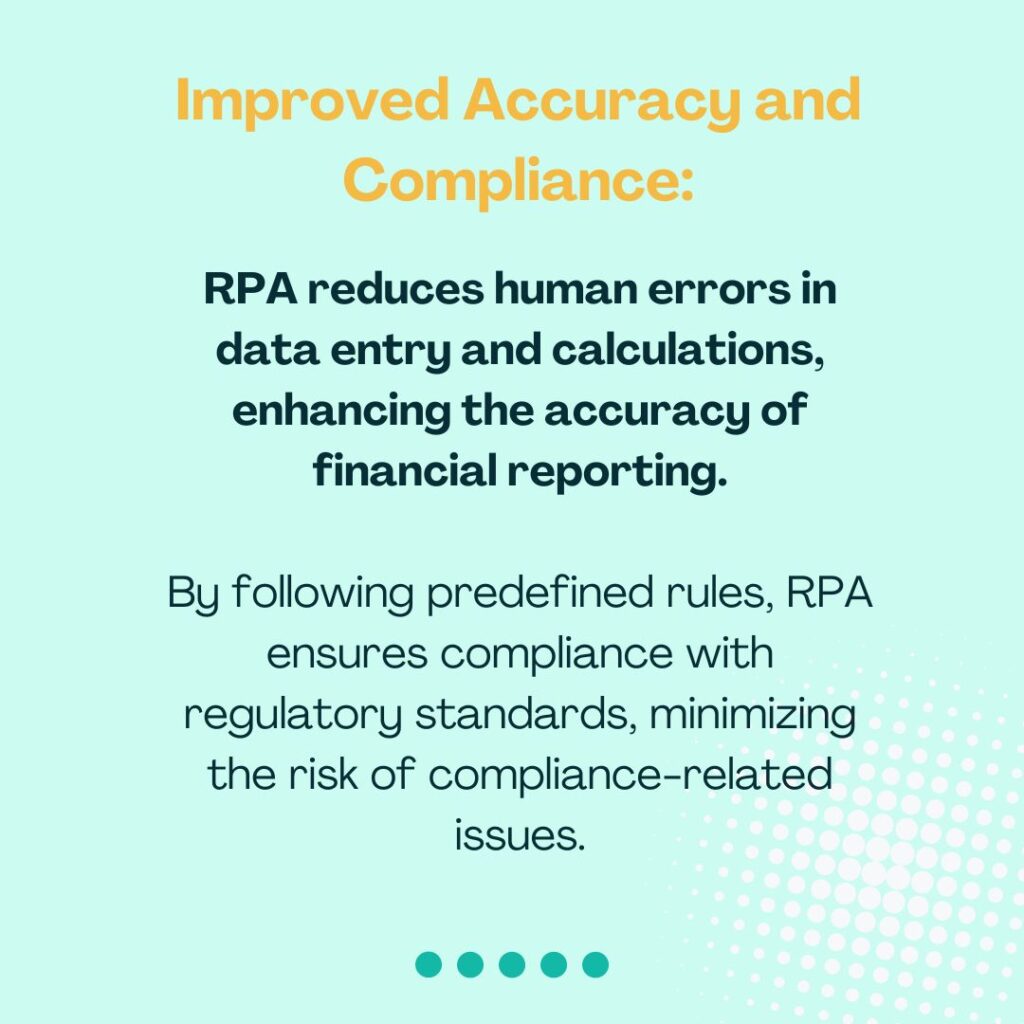
Real-Time Data Processing and Analysis
RPA enables accountants to process and analyze financial data in real-time. Bots can gather data from various sources, reconcile accounts, and generate reports instantly. This empowers accountants to respond promptly to client requests, address queries, and make informed decisions. Real-time data processing allows for agile decision-making, helping clients stay ahead in a fast-paced business environment.
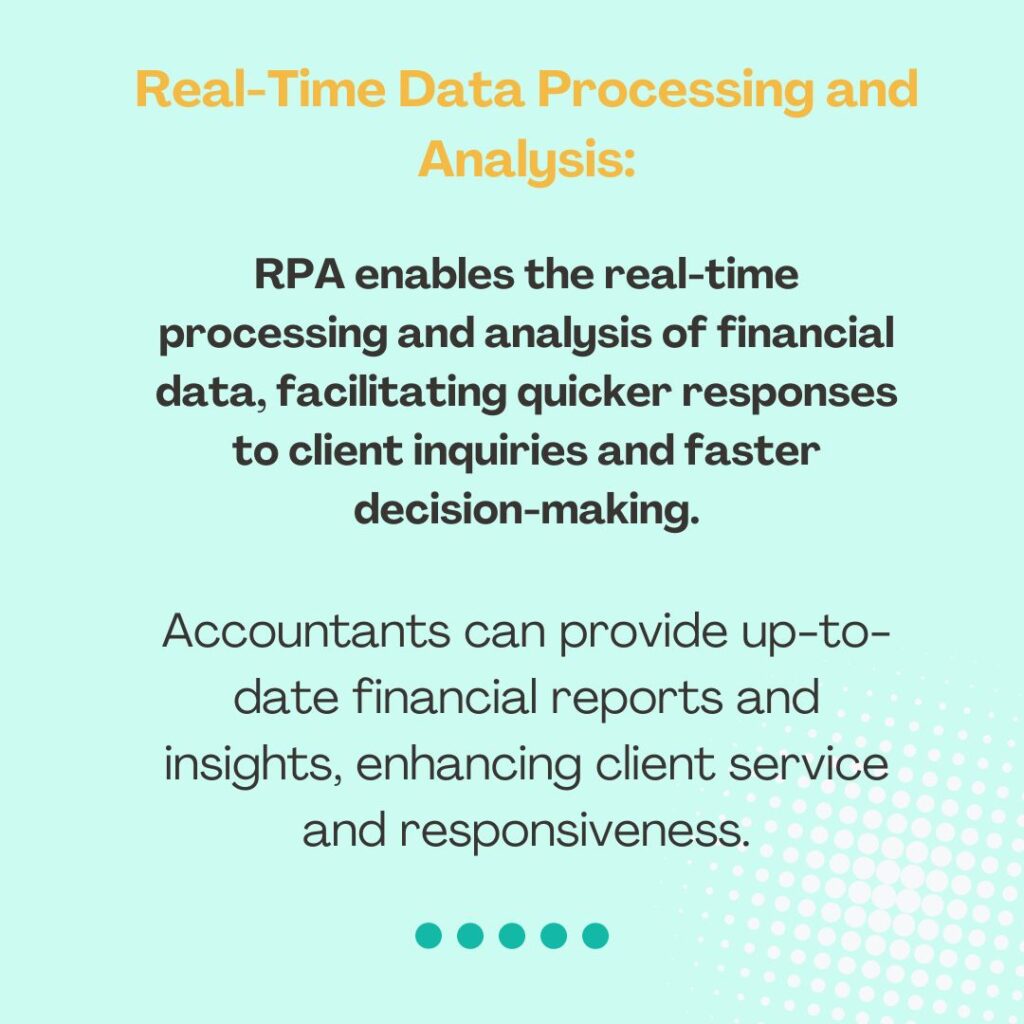
Increased Scalability and Cost Efficiency
RPA offers scalability by effortlessly handling large volumes of data and repetitive tasks. Accountants can easily scale up or down their RPA processes to accommodate business needs without significant additional costs. RPA reduces the dependency on manual workforce, leading to cost savings in terms of manpower and operational expenses. Accounting firms can achieve higher productivity and cost efficiency, making them more competitive in the market.
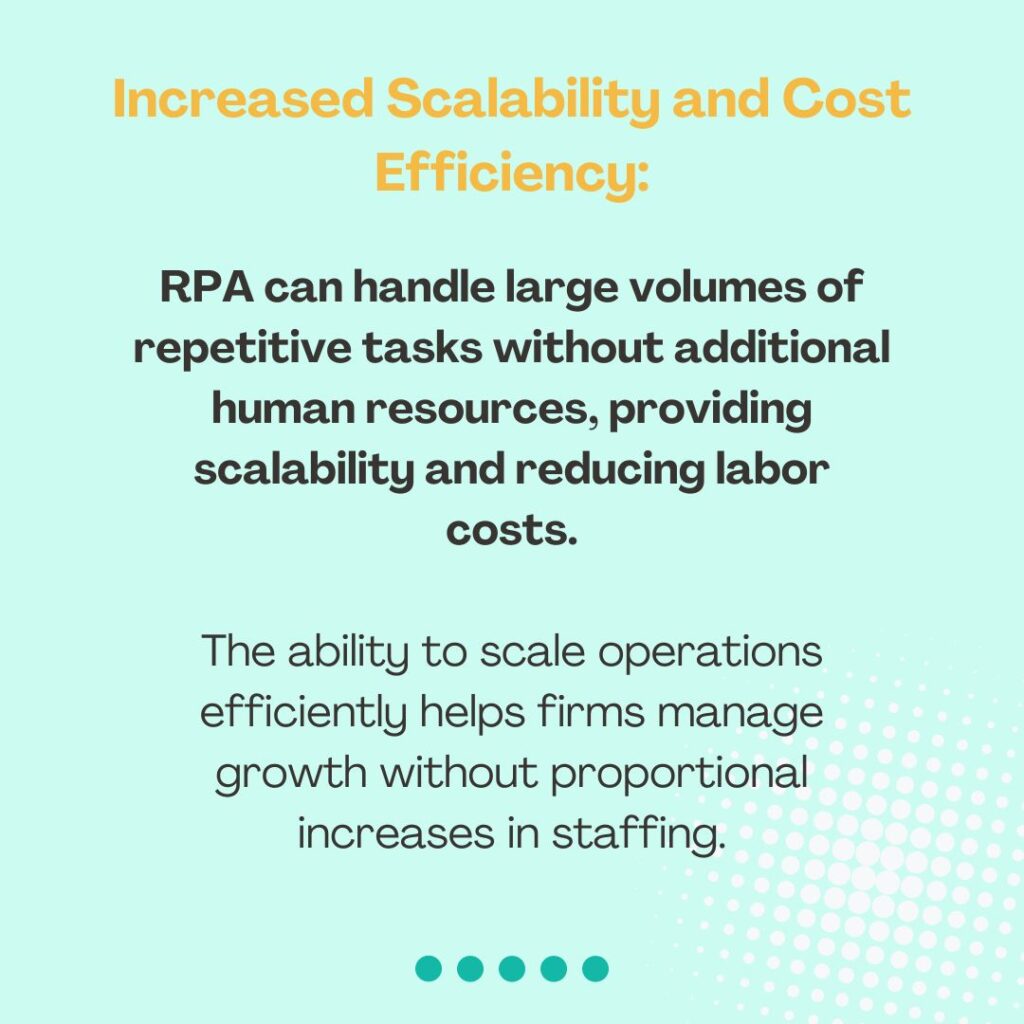
Enhanced Client Experience
RPA transforms the client experience by providing faster and more accurate services. With RPA, accountants can generate real-time reports, perform on-demand analysis, and provide immediate insights to clients. Clients no longer have to wait for prolonged periods to receive updated financial information or to have their queries addressed. The seamless and efficient service provided by RPA improves client satisfaction, strengthens client relationships, and positions accounting firms as trusted partners in their clients’ success.
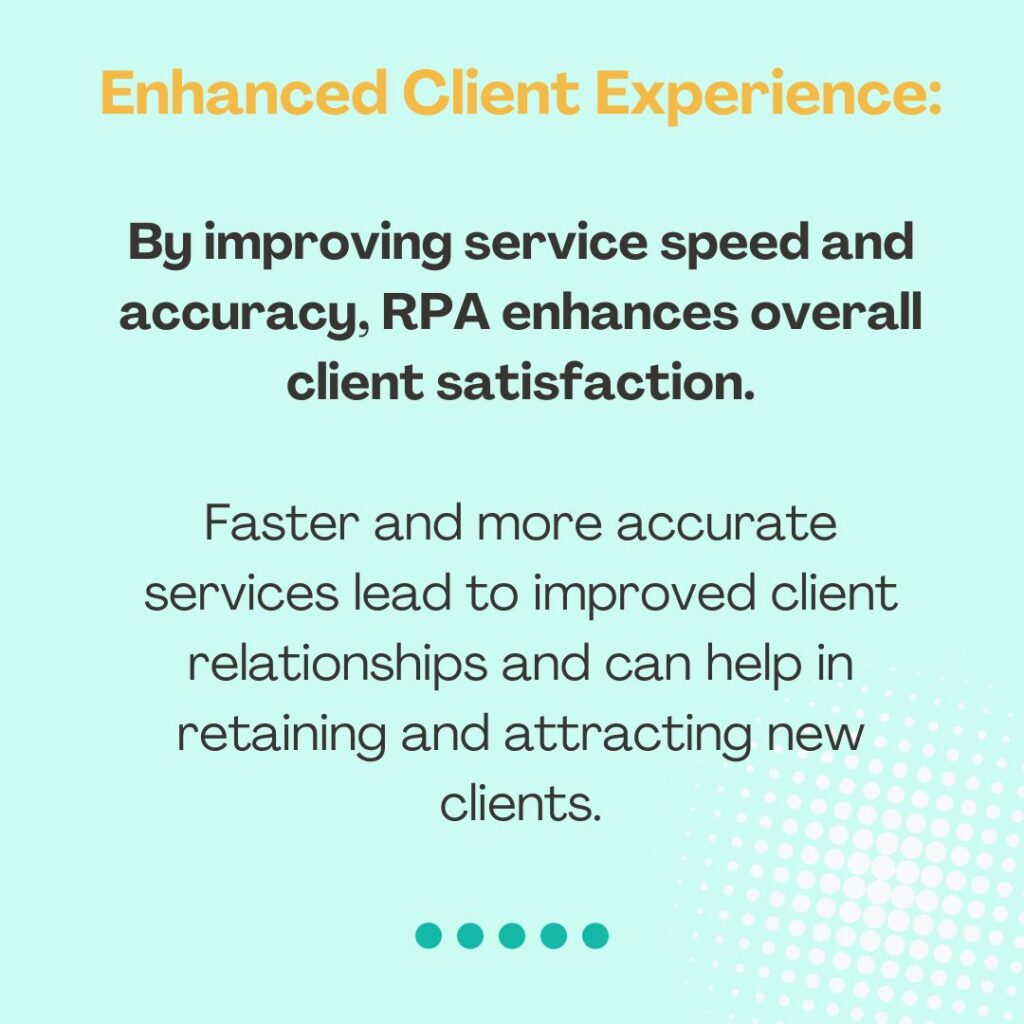
RPA Challenges to Address in Accounting
The implementation of RPA, however, is not without its challenges. Like any transformative technology, there are considerations to be taken into account.
- Firstly, identifying the right processes for automation is crucial. Accountants must conduct a thorough analysis of their workflows, identifying repetitive and rule-based tasks that can be effectively automated. This requires a keen understanding of the nuances and intricacies of accounting processes, ensuring that the appropriate tasks are selected for automation.
- Another challenge lies in the integration of RPA with existing systems and software applications. Compatibility issues may arise, and accountants must ensure that the bots can seamlessly interact with various platforms, such as accounting software, enterprise resource planning (ERP) systems, and data analytics tools. Collaboration between accountants, IT professionals, and RPA experts is essential to overcome these challenges and ensure a smooth integration process.
- Furthermore, accountants must prioritize data security and privacy when implementing RPA. Confidential financial information is at the heart of the accounting profession, and stringent measures must be in place to safeguard data. Implementing robust security protocols, encryption techniques, and access controls are critical to prevent unauthorized access and ensure compliance with data protection regulations.
Conclusion
Robotic Process Automation is revolutionizing the accounting industry, offering immense potential for improved work efficiency, enhanced client outcomes, and a competitive advantage. By automating repetitive tasks, accountants can focus on high-value activities, deliver accurate and timely financial information to clients, and stay ahead of the curve in a rapidly evolving industry.
However, successful implementation requires careful planning, process analysis, and collaboration between accounting professionals and technology experts. Those who capture the RPA advantage will undoubtedly thrive in the modern accounting landscape, transforming their work processes and delivering exceptional value to their clients.


